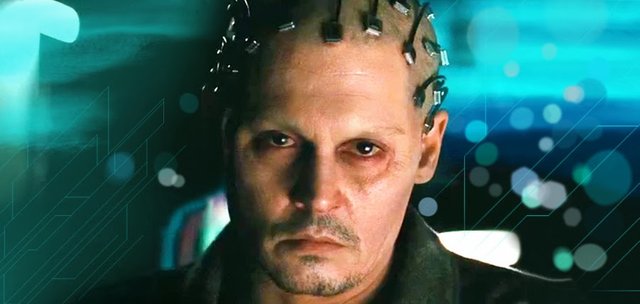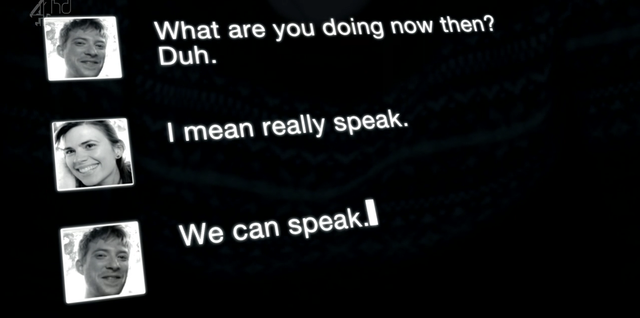Sci-Fi nerdette in hiding

I've always entertained the thought of one day, living amongst Robots. Admittedly, I am one of the few people out of my female peers that take a bigger interest in technology, it's progression, and it's impact on our future daily lives. In-fact, I'm one of the only people that ponder these things in my friendship groups full stop.
I was introduced to the likes of Star Wars, Star Trek and other classic Sci-Fi movies / TV Programmes quite late, but I found them immensely fascinating and I'm secretly (not a secret anymore) a Sci-Fi nerdette. Although I prefer more thought provoking sci-fi movies than the overly produced CG variants.

The one thing that made me read it was when I watched the movie Transcendence starring Johnny Depp. If you've not seen it, it's basically about the transcendence of humans from biological form to a non-biological higher consciousness. The movie asked some compelling questions, and offered some riveting examples of how technology is on the precipice of exploding exponentially upwards and what applications these new technologies could have both as a service to mankind, and as a detriment.
Of course, the transcendence to non-biological forms of life also pose some political, social, and philosophical questions which continue to draw a lot of discussion. Such as, if we some how were able to clone our minds into consciousness on a computer, would the fact that it's thoughts, reactions, emotions, memories, and personality match ours and thus be for all intended purposes be us? Alan-Turing's test did not require the AI to take on the same form as a human being, only that it conversed indistinguishably from one over a text dialogue.

Another interesting question would be what would happen if our organic body co-exists with our inorganic digital consciousness. Which one would actually be us?
Suppose we had a wooden boat, and for each piece of the wooden boat that aged, it was replaced, but the original part kept in a separate place. Continue this until all parts are placed with new parts. The old parts are then re-pieced together. Which boat is then the 'real' boat.
Isn't that what's happening all the time in our body anyway with cell reproduction?
Be Right Back, Science in action (Sort of)

I came across the thought provoking mini tv-series "Black-Mirror" which explored many repercussions of technology and it's darker potential impacts on society. One particular episode called "Be Right Back" was based on the theme of transferring the consciousness of the deceased to a computer. This time, through parsing the social media history of the deceased person, and recreating their personality with the information gathered.

Obviously, a person's social media activity is never enough of a data set to fully represent an individuals full in depth character, and in the short film, this was tragically apparent. However, given a more rigorous approach, perhaps prior to death, I do believe a better recreation could have been achieved. Martine Rothblatt argues that cloning the human mind is only a matter of decades away, and that it is perhaps even within our lifetimes, that we would be able to continue being with our next generations even when our organic bodies have longed turned to dust.
In her book, "Virtually Human" Martine Rothblatt talks about how in the near future, mindclones can be created which possess the thoughts, recollections, feelings beliefs, attitudes, preferences and values you have put into it. These mindclones are themselves made of mindfiles which are used like virtual disks by the mindware that has been specially designed to be the functionally equivalent replica of ones own mind. So, in her version of the future, it is entirely possible to capture sufficient amount of "data" in the form of these mindfiles to create doppelgangers of ourselves, and she even goes on to suggest that it is a better solution than battling the ethics of making organic clones as a means to extend our lives and consciousness.
Could Steemit be a Mindfile on Chain?
Writing allows us to slow down, it allows us to collect our thoughts, it allows us to structure our ideas the way we think we have them stored in our brain. While 250 char short form posts on twitter and facebook exude some aspects of your personality, they definitely express less than full form writing. One of the challenges of creating a self-aware consciousness on a computer is capturing the individual's qualities as a cumulative process of growth. Naturally, what we are today, is a result of what we did yesterday, and the day before and so forth, and those connections are important in establishing the precedence of knowledge built up over time.
If a party wanted to build my mindfile, bar sticking mental prongs into my head, I would honestly suggest parsing my blog at steemit over any of my other social media profiles, because of how much more personality and content about me can be used. Before the digital age, people emphasised a lot more of their time on documenting their lives, putting their thoughts to paper. With so many short form social media sites out there, it's actually rare for people to sit down and reflect on deeper aspects of their lives, let alone write it down.
The idea of having a mindclone of myself built from my Steemit blog excites me very much, and I honestly can't see why that isn't a possibility in the future. I relish and wish that I live to see the day that I get to say hello to myself.
If i'm you, and you're me, than who am I?
ooh, you should let this nerdette out more often! (I am not demeaning your other posts. I upvote them quite often!) There is a variant of sci-fi you might also like called "speculative fiction" and you have already probably heard of it. It's basically a way to blend genres together into something new.
forgive me for backing up and making a China-related comment. But, I figure that you know both cultures and might appreciate. For me, it's fascinating to live in China right now. It seems this country I am living in went from outright banning science fiction to not only accepting it, but also producing a writer like Liu Cixin who then wins the Hugo award for best science fiction novel. I know 100% of my blogging activity is about China, but it's fascinating to be an outsider and having a front row seat to a culture that is so rapidly changing.
As for the concept of the singularity and what some call "post-humanism," it is sometimes hard to deny that direction sometimes. Chip sizes keep getting smaller and more powerful, and then there are now blockchains and the internet of things.... and I am just guy with a bunch degrees in English and knew nothing about this stuff six months ago. To me, that's not only funny, but an indicator about how much disruptive technological change is working its way into everyday life.
Downvoting a post can decrease pending rewards and make it less visible. Common reasons:
Submit
China seems to make rapid progress on anything that they choose to support. I would argue that the potential was always there, it was just suppressed by repressive regime.
Downvoting a post can decrease pending rewards and make it less visible. Common reasons:
Submit
I would agree with that, totally. The culture and the imagination has been there for thousands of years.
Downvoting a post can decrease pending rewards and make it less visible. Common reasons:
Submit
Thank you for sharing this nice nerdy side. Cloning your mind is indeed a fascinating idea and I'm curious when Elon Musk gonna jump on it!
I also like your take about writing. Back in the days people wrote long letters, carefully drafted their words and opinions and in certain ways documented time historic events. Today we can read these old letters and gain a grasp of how people lived back then. It's like a time portal. Steemit has the potential to grow into such a portal too, documenting good ideas, inspiring visions and philosophical discussions for millennials.
The next big step is how to conserve bit and bites for a time without energy. For a time when humanity goes through a dark age and the Internet will be offline. How can we preserve our knowledge for eternity? What if we could save knowledge into DNA?
Downvoting a post can decrease pending rewards and make it less visible. Common reasons:
Submit
I really like your idea of saving knowledge into DNA. I believe this was implied in the film Transcendence. Conserving information without energy seems like a matter of which actor you view it from. There's always some 'work' involved when 'writing' or 'reading' from any medium. Does that not require time and energy ?
Downvoting a post can decrease pending rewards and make it less visible. Common reasons:
Submit
The scientific group doesn't even know what the mind is yet, so how do they even consider that their ability to clone the mind is only decades away?
From a metaphysical viewpoint, scientists are very silly and narrow minded when considering the brain. The subconscious and the unconscious are delved into by psychologist who cannot believe all the stuff they find down there.
Consider out of body experiences (or near death experiences). If the brain is where the thoughts are, then how are they being thought? Or, how are they experiencing elsewhere? In some examples, the EKG showed that they were dead. So, how is this possible?
They haven't even worked out ESP. Science does not want to accept that it exists. And when you put ESP in the lab, it almost always fails. However, you can find many groups that will have you believing something is happening just by the shear number of documented happenings. And if you stay in such groups, you will often experience enough of them yourself and find it hard to ever put your brain back into the "scientific" box.
So, will we ever upload our consciousness into a computer? Maybe, but the computers will be nothing like what we have today. Our computers are very very stupid. Our programs on them idiotic. If these weren't true, computer viruses and hacking wouldn't be a concern.
Another piece to add. You do not have a trillion cells with a trillion DNA. You have one DNA in a trillion locations.
Downvoting a post can decrease pending rewards and make it less visible. Common reasons:
Submit
It's not just the computers, the software isn't there either.
For the past few decades, people have been talking about Quantum Computers and the massive leap it brings in computing power. As programs become more complicated and clever, so do the people writing the viruses. It's a continuous cat and mouse game.
The philosophy of what is considered a mind is so debated, like for instance being self aware, a prerequisite of having consciousness. More so, I think people want to create the indistinguishable illusion that they are conversing with someone with the same intellect and responses.
In the same sense, any sufficiently advanced AI would be indistinguishable from the real thing.
Downvoting a post can decrease pending rewards and make it less visible. Common reasons:
Submit
This is a hard one for me to reply to.
I can answer the responses, but I can bring no evidence to bear. And the answer gets freaky weird quickly.
You write english very well. And I only read ancient chinese. So, I am unsure where your english lexicon ends. Forgive me if I lose you with these words.
Quantum computers are stupid. They are just an idea to push boundaries of size and state. Currently they are an evolutionary dead end. However, someone may be able to, forgive the pun, make a quantum leap onto a new track of computing.
It is because of how stupid computers are that we still have viruses.
A computer cannot tell if a particular memory location is used. The program that used it could be long gone, or forgotten about it completely, and the computer has no way of knowing. This is because computers and their memory are really really simple machines. Way too simple for what we want from computers these days.
A computer cannot tell if it is running a legit program or a virus. The operating system should be smart enough to tell.
Take this example. Your smart phone has an application that should only be using the screen. If it asks to use the microphone and camera, your phone should freeze it, and then ask you if you want to give it permission. (you can get this feature by using some of the new stuff from McAffee, the guy, not his old company) And you should be able to query the operating system and ask who in the last minute used the microphone, and get a list. These things aren't happening yet. The minimum I expect from current OS is to sandbox everything. But they don't even do that yet.
It is not a game of cat and mouse, its about programs/computers being in the dark ages.
Long before we get to AI, we should get to an OS that knows what a virus is. Humans can tell when a virus is messing up their computer. But virus software is still in the "image" recognition stage. I feel it is long overdue that we should have moved to virus software recognizing behaviour.
On magic vs technology. This is really a human thing. There are many advanced races that don't use technology at all.
There is also a point that both magic and technology are based on physics. Physics much much larger than the little box we put it in. We haven't even combined the fields of physics and metaphysics yet! When we do, we will find many things are possible; massless objects, spatial distortion, rejuvenating bodies...
Now, on magic. Do you define synchronicity as magic? Could you build a piece of technology that allowed you to be in the right place at the right time to meet the exact person you were looking for? (When you didn't know that you would be near that place today, and didn't know who you were looking for). These are the areas of magic. Fate and I-ching, both magic.
Downvoting a post can decrease pending rewards and make it less visible. Common reasons:
Submit
it seems Shakespeare had the same idea back in the 16th century of immortalization through writing. Not sure that worked for him LOL!!
Downvoting a post can decrease pending rewards and make it less visible. Common reasons:
Submit
Downvoting a post can decrease pending rewards and make it less visible. Common reasons:
Submit
love Shakespeare - taught him too long to unwilling minds, but now I can read him by the fire and grant him a faint immortality :)
Downvoting a post can decrease pending rewards and make it less visible. Common reasons:
Submit
I was just remarking to my Chinese students how much American high schoolers hate slogging through Romeo and Juliet. =D
Downvoting a post can decrease pending rewards and make it less visible. Common reasons:
Submit
it's always a challenge to make it accessible to the modern audience, but I'm sure you know all the tricks LOL!!
Downvoting a post can decrease pending rewards and make it less visible. Common reasons:
Submit
jag älskar
Downvoting a post can decrease pending rewards and make it less visible. Common reasons:
Submit
then an important question should be asked: do our minds consist of only pieces that are coded in 'languages'? Is there something that is truly unspeakable in our souls?
of course, even so, your hypothetical 'self' can still exist - only it will be the language part of you. still very spooky. :) great article, by the way.
Downvoting a post can decrease pending rewards and make it less visible. Common reasons:
Submit
I would say I have thoughts and emotions sometimes that cannot be expressed in any language I know. I don't think this means that they couldn't be replicated on another medium... Something is happening in my brain when I have emotions we just need a way to map it and then reproduce it in software.
Downvoting a post can decrease pending rewards and make it less visible. Common reasons:
Submit
agree totally. my remarks are the part where she said about mindclone from steemit blog. I am pretty sure it only stores texts. :)
Downvoting a post can decrease pending rewards and make it less visible. Common reasons:
Submit
Интересно
Downvoting a post can decrease pending rewards and make it less visible. Common reasons:
Submit
Thank you ! Good article !
Downvoting a post can decrease pending rewards and make it less visible. Common reasons:
Submit
I used to be more of a Star Wars person but I think I'm more of a Star Trek person now.
Downvoting a post can decrease pending rewards and make it less visible. Common reasons:
Submit
wonderful. Love your thinking. great post
Downvoting a post can decrease pending rewards and make it less visible. Common reasons:
Submit
I love futurist ideas like transhumanism and love the amount of attention these ideas are getting (thanks to posts like this)! I am skeptical about the ability to transfer consciousness, but like exploring the idea.
I included your piece in today’s #philosophy-review. Keep up the great posts!
https://steemit.com/philosophy/@aaanderson/the-philosophy-review-12-8-2016
Downvoting a post can decrease pending rewards and make it less visible. Common reasons:
Submit